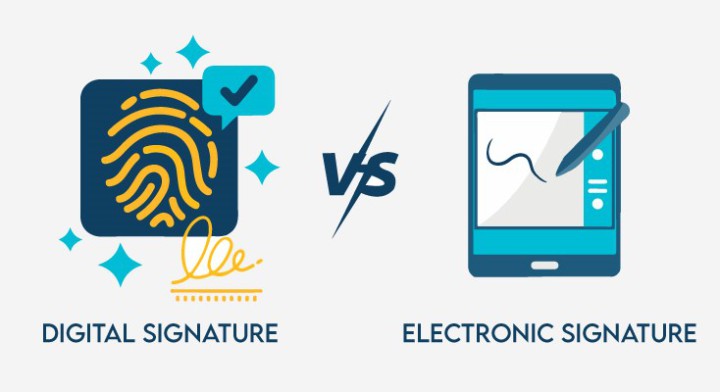Digital Signature
Difference between Electronic Signature and Digital Signature

What is an Electronic Signature?
Electronic Signature or E-Signature is a digital form of a physical/wet-inked signature without any codes or standards attached to it. The ESIGN Act, 2000 gave electronic signatures legal standing the same as wet-ink signatures. An e-signature can be either a symbol or an image, only used for verification purposes. It can be attached to a message or document as an identification or a consent. The only minor inconvenience is that an electronic signature is not validated by any trusted authority or trust service providers hence is generally not authorized.
What are its uses?
Electronic signatures are a safer gateway when considered for handling student applications or employee onboarding. At present, electronic signatures can be used in executing works from all kinds of businesses. Some of the uses of e-signature are :
1. Vendor/Supplier Agreements
E-signatures can be a deal saver for managers or business owners when it comes to locking in deals at a price of agreement with the vendor immediately.
2. Sales Contracts
Sales contracts are the most common and vital form of document signed by many organizations. If the managers of such organizations use e-signatures to e-sign documents, it means they can close more deals faster. E-signatures are also a good option for signing business-to-consumer (B2C) or business-to-business (B2B) sales agreements.
3. Customer Approvals
Businesses that deal in custom-made products need that final approval before they start production. E-signatures help in taking approvals and storing them securely with ease so that you can move on to the manufacturing process and deliver your products on time.
4. Employee Onboarding
When hiring a person there is a lot of paperwork involved starting from offer letters, background checks, performance appraisals, contact information, employee handbooks etc. All the load of such paperwork can be executed smoothly and easily with an e-signature.
5. Signing Legal Agreements
With the legal stature, e-signatures are widely used for signing legal agreements like intellectual property licensing and NDAs.
6. Secure Online Banking
When it comes to monetary transactions using electronic signatures gives you the comfort of knowing that your security is not compromised. Many financial institutions prefer the use of electronic signatures because there is less chance of manipulation of transaction records.
7. Filing Tax Returns
The Internal Revenue Service (IRS) strongly recommends people and businesses to file their tax returns electronically to get a faster refund. It is because electronic signatures make the process so much easier and convenient.
8. E-Signing Legal Documents
Various professionals from the legal industry like lawyers, investigators, attorneys, etc. have to rely on signatures for paperwork on a daily basis. E-signatures can save them a lot of time and use the same time to complete other duties and serve clients efficiently.
What is a Digital Signature?
Digital Signature is a type of electronic signature which comes with encryption asserting more security. To understand digital signature in an easy manner, we can visualize it as an electronic fingerprint used to encrypt and identify a person’s identity. Unlike electronic signatures, digital signatures are authorized by trusted certificate authorities or trusted service providers. It is a more preferred method of online signing over electronic signatures because digital signatures stand to be more secure and authentic.
What are its uses?
A digital signature uses Public Key Infrastructure (PKI) as an armour to encrypt documents and keep your personal data safe. A PKI uses a mathematical algorithm to generate two keys - one public and the other private. This ensures that your messages are encrypted and can be decrypted only by the sender or end receiver.
Digital signatures are widely used across the globe, making it convenient for people from different walks of life. To read the uses of digital signatures in length please refer to our blog titled Top 10 Uses of DSC
E-Signature V/S Digital Signature?
Both widely used to sign documents online, with almost similar nature, let us now examine the difference between an electronic signature and a digital signature.
| Feature | Electronic Signature | Digital Signature |
|---|---|---|
| Purpose | It is used to verify a document. | It is used to keep a document secure. |
| Regulation and third parties’ participation | It is not authorized by trusted certificate authorities or trusted service providers. | It is authorized by trusted certificate authorities or trusted service providers. |
| Use of cryptographic algorithms | It is the digital form of a wet-ink signature which has a legal binding and is secure. | It is a type of an electronic signature which relies on Public Key Infrastructure (PKI). |
| Verification | You cannot verify and validate an electronic signature. | You can verify and validate a digital signature. |
| Advantages | Easy to use but is vulnerable to tampering. | Preferred over electronic signature because of its higher level of authenticity. |
| The intention of the signer | Signer agrees to abide by the terms and conditions of a contract/agreement. | Signer is concerned about the security of the documents. |
| Visual mark | Digital signatures require a digital signature certificate to verify a signer’s identity so that the signer, once verified, can use the digital signature to sign digitally documents containing sensitive data. | Electronic signatures are used as an expression of handwritten signatures, a pin code or any kind of consent by businessmen to sign contracts and agreements. |
Recent Posts


Categories
- Digital Signature 16

Leave a Comment